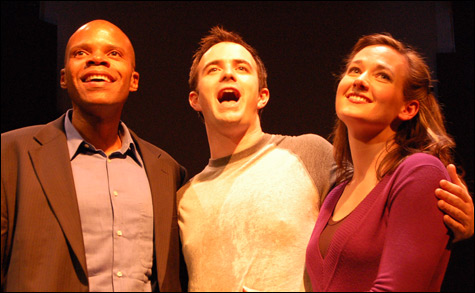tick, tick ... BOOM! at New Rep; A Funny Thing Happened on the Way to the Forum by BTW; American Buffalo at WHAT

TICK, TICK . . . BOOM! Would Jonathan Larson have become the slacker Sondheim?
|
When Jonathan Larson, the Pulitzer-winning composer of Rent, wrote
TICK, TICK . . . BOOM!
, he could not have known what the “boom” would be. The fact that we do gives poignancy to the autobiographical chamber musical penned by Larson in 1990, retooled after his death by fellow Pulitzer honoree David Auburn, and currently issuing its big wail across the tiny downstage space at New Repertory Theatre (at the Arsenal Center for the Arts through October 21). Larson died just weeks before his 36th birthday, on the eve of the phenomenal success of Rent, the fruits of which wound up on other plates. The earlier show began life as an autobiographical “rock monologue” in which a struggling composer, on the brink of his 30th birthday, suffers deprivation and doubt while holed up in a rattier part of New York trying to pen the “great American musical” for his generation. Whether or not you consider Rent to be that show, tick, tick . . . BOOM! derives extra piquancy from our knowledge that, were it not for the pesky aortic dissection that felled him at the intersection of Skid Row and Easy Street, Larson would now be 47. Whether or not he would be fêted as the slacker Stephen Sondheim is another matter.
Even given Auburn’s expansion of the material to include two additional performers who play Jon’s best friend, girlfriend, and a number of caricatured smaller roles, tick, tick . . . BOOM! isn’t much of a musical. Many of the songs seem to have been shoehorned into the oft-self-indulgent material. But they do give us a further opportunity to evaluate Larson as a tunesmith, and the show provides another glimpse into the insecure world of the unsung artist trying to figure out whether he or the world is no good.
There are several personable songs in the show, though only the best, “No More,” is as driving as the score of Rent (which isn’t all that propulsive). In this number, Jon and his soon-to-be-ex-roommate, Michael, who has traded in thespian poverty for a Madison Avenue marketing job and an apartment with a doorman, tour the new digs, with Jon on air guitar as Michael makes fluttery vocal love to his new walk-in closet and butcher-block table. There is also an amusing paean to that refined mistress, “Sugar,” and a funny, semi-scathing number about New Yorkers who brunch.
The trio putting the piece across at New Rep, under Stephen Nachamie’s choreographically precise direction, are appealing — as is the sound of their unamped voices, particularly that of Brian R. Robinson. As Michael, who is nursing an incipient tragedy of his own, Robinson brings a big, lustrous sound to even the inconsequential numbers. As Susan, the dancer girlfriend hankering for a dishwasher, Aimee Doherty brightens up the sad-eyed simp with a healthy dose of vamp. Guy Olivieri, as Jon, is the weakest of the singers; if he doesn’t bleat, he can be overwhelmed by the four-man band stretched across the stage between the action and backdrop projections of New York. But the unassuming Olivieri supplies his character with a boyish, sometimes goofy intensity that compensates for his whining and pretension. And when Jon gets an encouraging phone message from Sondheim, like a buck-up to Moses from God, he exudes something between laughing and keening that sounds like pure joy.
“The theater is a temple,” intones Roman slave Pseudolus at the top of
A FUNNY THING HAPPENED ON THE WAY TO THE FORUM
, proceeding to brandish not a Torah or a virgin sacrifice but a clown nose and a rubber chicken. Indeed, this 1962 musical, with score penned by the actual Sondheim at 32, is a shrine to the baggy-toga comedy of Plautus wedded to the Music Hall and the Borscht Belt. In the Boston Theatre Works staging at the BCA Plaza Theatre (through October 20), it’s a shrine squeezed into the confines of a confessional and tarted up as if the priest were Charles Ludlam. But the Tony-winning paean to ancient love and lechery, with book by Burt Shevelove and Larry Gelbart, remains a worship-worthy bit of vaudeville.
“Everybody ought to have a maid,” asserts the jauntiest of the show’s mostly upbeat numbers. (This is a Sondheim for whom Passion wasn’t even a gleam in the eye.) But that doesn’t mean everybody ought to have a full orchestra or an elaborate set. As director Erick Devine told the Boston Globe, you don’t really need three edifices on stage, just three doors. And that’s what we get in Jenna McFarland Lord’s colorful representation of the neighborhood, with Marcus Lycus’s house of ill repute identified by a Vargas-y silhouette above a red-tinsel curtain and the entrance to Senex’s abode a massive revolving door that plays its part in the comedy. Since a character must be hidden on the roof, there are a couple of ladders that serve as percussion sets to augment an unseen three-person band (piano, trombone, and flute) and also give the stripped-down proceedings the aura of a Roman Our Town.